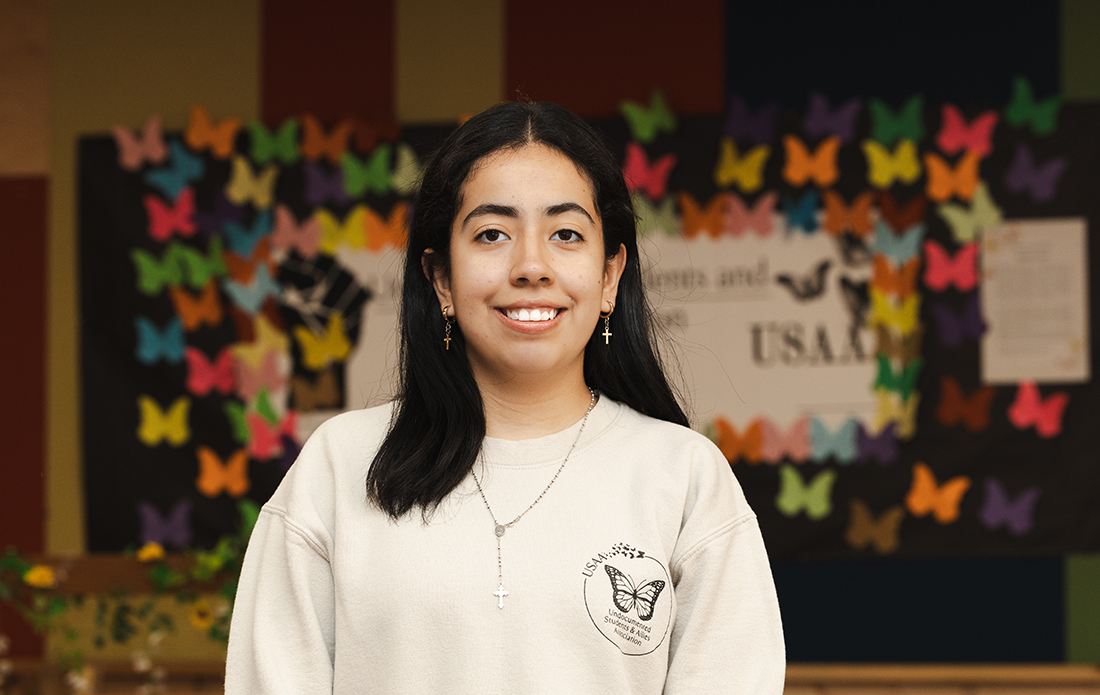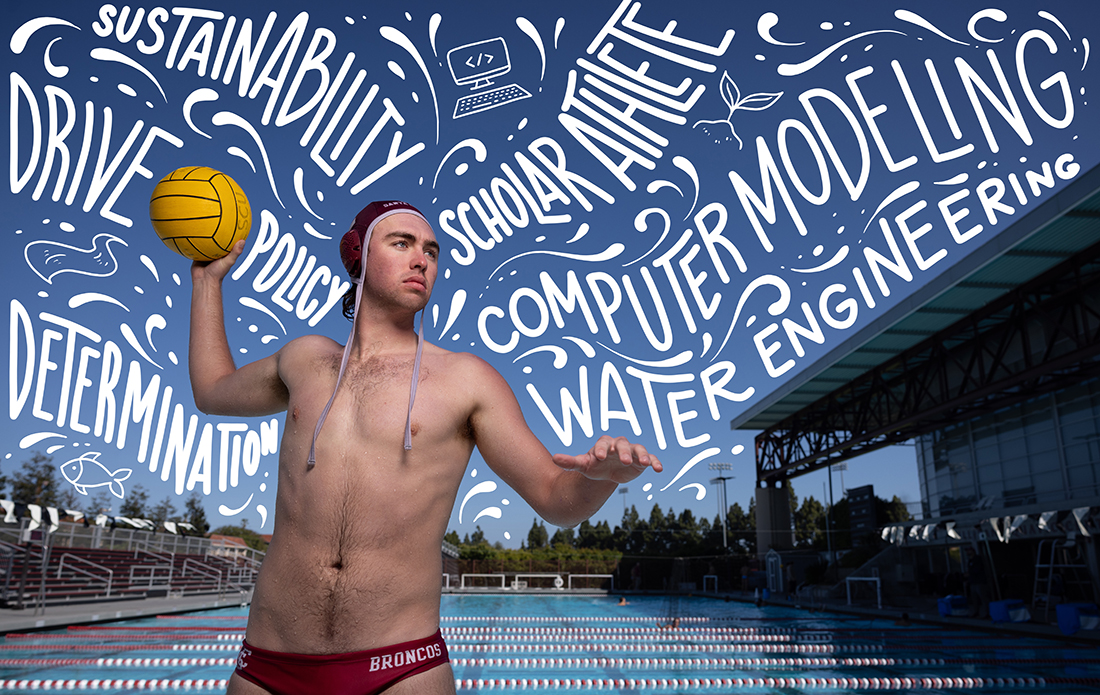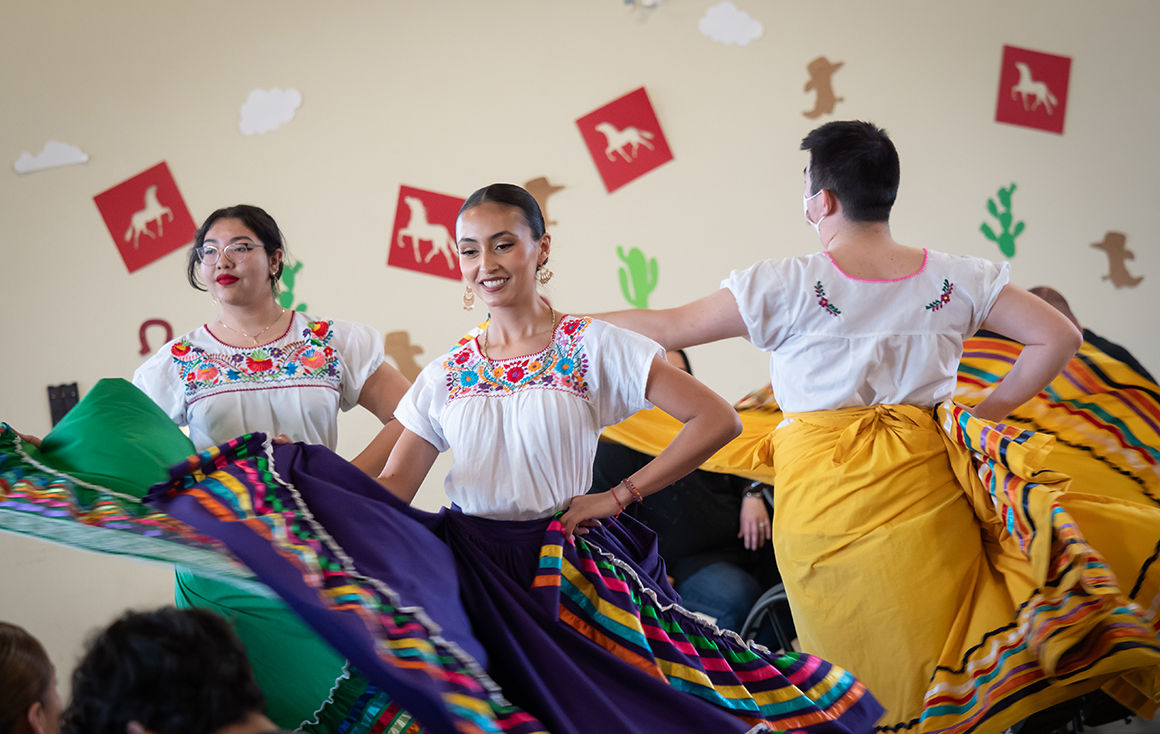Paying It Forward
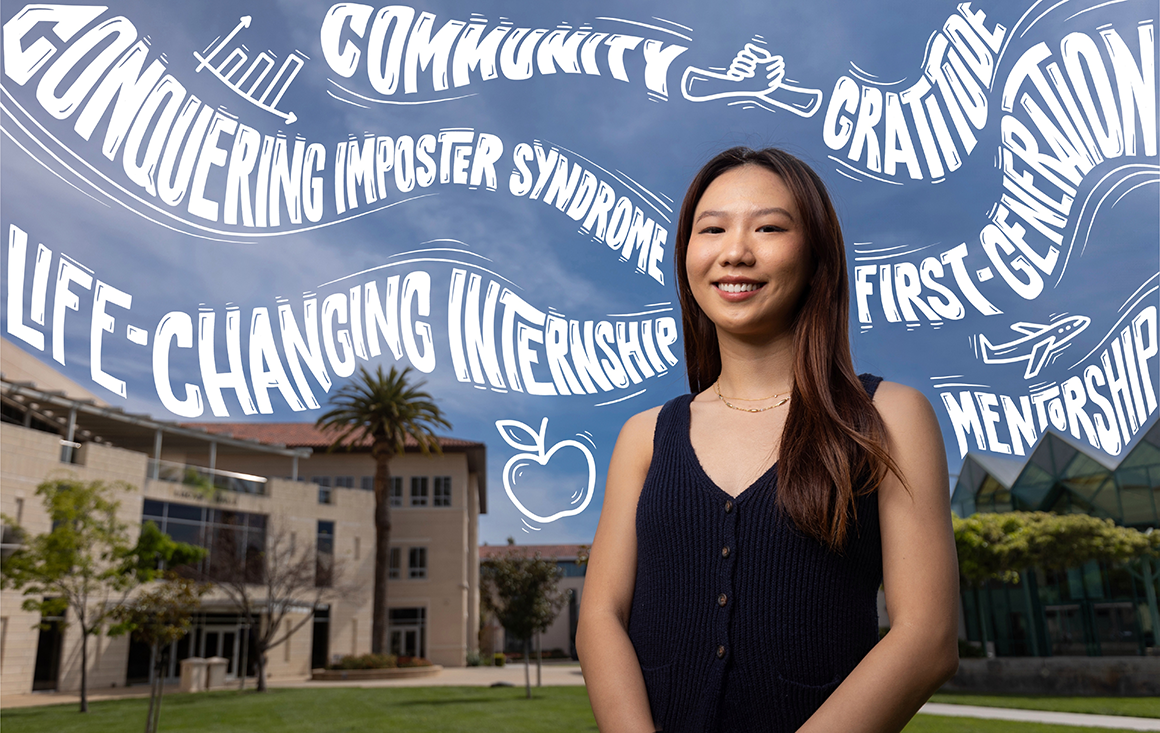
If you ask Shirfei Tay ’24 why internships are important, she’d say that internships not only reveal what you want to do, but also—sometimes, crucially—what you don’t want to do.
“For my whole life, I wanted to be a doctor, and in high school, I had an internship where I shadowed some physicians,” she recalls. “I realized it was not a workplace I would thrive in—I’d probably be really sad every day. Then, I was like, ‘Oh shoot! What should I do now?’”
She enjoyed high school economics enough to consider schools with strong business programs. Enter Santa Clara University with its nationally-ranked Leavey School of Business (LSB).
Because of COVID-19 restrictions, Tay couldn’t visit campus, so choosing Santa Clara ended up being “a shot in the dark,” but it’s a choice she would make again in a heartbeat since it led to yet another life-changing internship.
In 2021, Apple started Launch@Apple, one of its first diversity programs. The highly competitive internship program selected a couple dozen first-generation freshmen students and paired them with a mentor already working at Apple. Depending on performance, participants could continue the program into their sophomore and junior years. Tay was accepted, and as luck would happen, this internship helped her realize that finance was the right fit for her.
Her multi-year internship at Apple has since turned into a full-time rotational position at the Silicon Valley giant after graduation, and Tay credits Santa Clara for preparing her for this opportunity.
“I know a lot of students at private universities have parents who can help them with networking and internships, but I didn’t have that,” she says.
Born in Chengdu, China, Tay’s family moved to Hawaii when she was 8 to work in tourism. Her parents had never attended college and were doubly unfamiliar with the U.S. university system.
“They didn’t know what a professional business fraternity was, so they wouldn’t have even known to suggest I should try to join one,” she explains. “Being at a college where I was able to get those resources and ask for help was so important.”
On the cusp of this next chapter of her life, Tay takes a moment to reflect on the community connections and professional resources that shaped her SCU career.
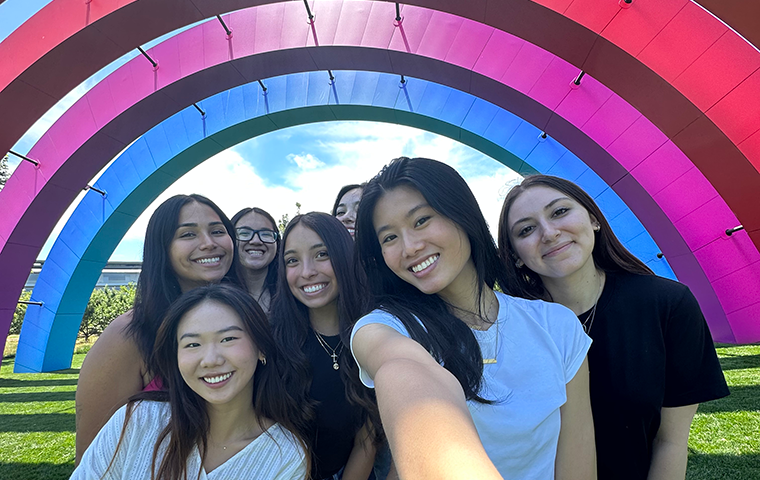
Tay (bottom left) and her friends, fellow interns at Apple.
Looking back, what made Santa Clara the right pick for you?
One of my biggest concerns going to college was how I was going to afford it. I ended up choosing Santa Clara because they offered a great financial package for me—between scholarships and aid, I’m basically here on a full ride.
Another thing that really drew me to Santa Clara was LEAD, the first-generation student program. That’s something I didn’t hear a lot about from other colleges, and immediately when I was accepted into SCU, LEAD reached out to me—even before I committed. It felt nice to know that I was going to have some sort of guidance going into college after the application process, which was difficult to figure out. My parents tried their best to help me, but I had to fill out the FAFSA for myself and learn how to complete tax documents on their behalf.
How important was finding a community at SCU?
Being able to relate to people with similar backgrounds helped me feel more normal. Not that I felt really out of place, but because it’s easy for me to compare myself to others, especially in college where everyone’s the same age as me.
I struggle a lot with insecurity and imposter syndrome, but having people who are older than me and who came from the same place, like at LEAD, gives me comfort that I’m going to make it through.
I was also an active member of the Vietnamese Student Association (VSA). Even though I’m Chinese, not Vietnamese, being part of this group allowed me to make friends with other students of color and have that kind of support. Also, when I came to Santa Clara, it was my first time meeting so many people who were Vietnamese, so it was nice to learn about a new culture.
You mention struggling with imposter syndrome—what was your experience with it, and how did you learn to deal with that feeling?
When I applied for Apple’s Launch program, I honestly didn’t think much of it. I had joined the business professional fraternity, Delta Sigma Pi, so I was just practicing sending applications out. But when I got accepted, a lot of people in my fraternity and the business school said, “Oh, wow! You got an internship with Apple. You must be so smart and you must work so hard.”
But hearing this praise, I started to think, “Oh, I must have gotten lucky. It was a diversity program. That’s how I was able to get work at all.”
That was very hard to navigate because I knew I deserved it, but it was hard to believe in myself sometimes.
What really helped was the mentor I had at Apple, Emi Bellwood ’20. She was also a first-generation Bronco and a POC, so I would talk to her a lot about what I was feeling. Emi told me imposter syndrome never really goes away, no matter where you’re at in life. So, knowing that it’s going to accompany me throughout my life has made me more at peace with it. What also helped was vocalizing it and saying to myself, “This is the work I did to get here.” It was a hard process to get into this program, and seeing those facts laid out in front helped.
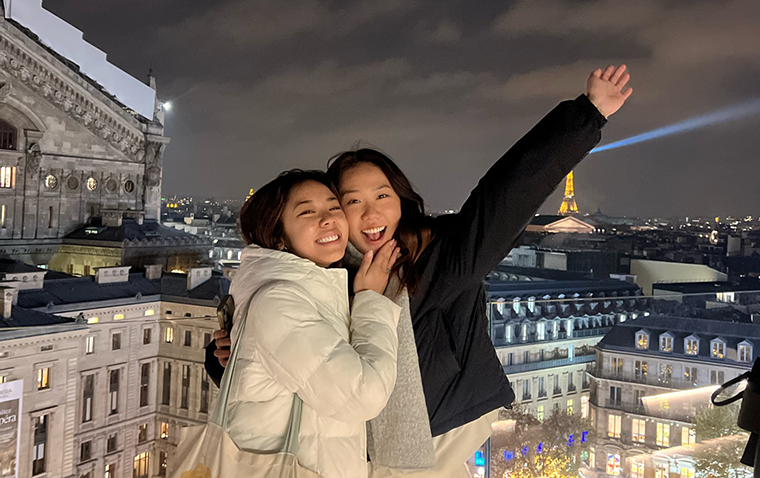
Tay (right) meeting her friend and mentor Angel Lin '23 in Paris.
Were there any mentors who shaped your time at SCU?
Brenda Versteeg B.S. ’97, MBA ’09 runs the Accelerated Cooperative Education (ACE) Leadership program and the Peer Career Consultant (PCC) program at the Leavey School of Business. She has so much experience, and when I was worried about my performance at a point when a lot of interns weren’t getting job offers, Brenda encouraged me to advocate for myself and guided me on ways I could approach that conversation with my manager.
Also, Angel Lin ’23 was a big reason why I’m so grateful for being part of VSA. She was valedictorian last year and did so much with her time at Santa Clara. I always felt comfortable talking to her because she was so wise, but it never came off as condescending. She comes from a very similar background to me and was always honest with me when I would share my experiences of not just being first generation, but also struggling financially at school. I never even told her I think of her as a mentor, but I really looked up to her. She was amazing and so much fun to be around.
You currently work as a Peer Career Counselor. With the roles now reversed, what has becoming a mentor for others meant to you?
I received so much support from SCU and from LEAD specifically, so I wanted to find a way to pay it forward.
I started as a peer advisor at LSB helping freshmen with their four-year plans. Because I was only a sophomore at the time, sometimes I would be like, “I don’t know if I’m qualified to tell you all of this, but this is my experience.” Even though I doubted myself a little, I’d say that many of the students I advised appreciated my suggestions and were thankful they had someone who could give them some guidance.
Later at Delta Sigma Pi, I became a professional mentor for some of the younger students in the fraternity. That was one of the first times I developed a personal relationship with the student I was mentoring. We met weekly to talk about his career, classes, and study abroad. Now, after working so hard toward getting an internship, he’s been telling me about everything he’s been getting accepted into and it makes me feel proud that I was able to help him out.
Those experiences gave me the confidence to become a Peer Career Consultant, which is what I’m doing this year, and it’s been really rewarding.
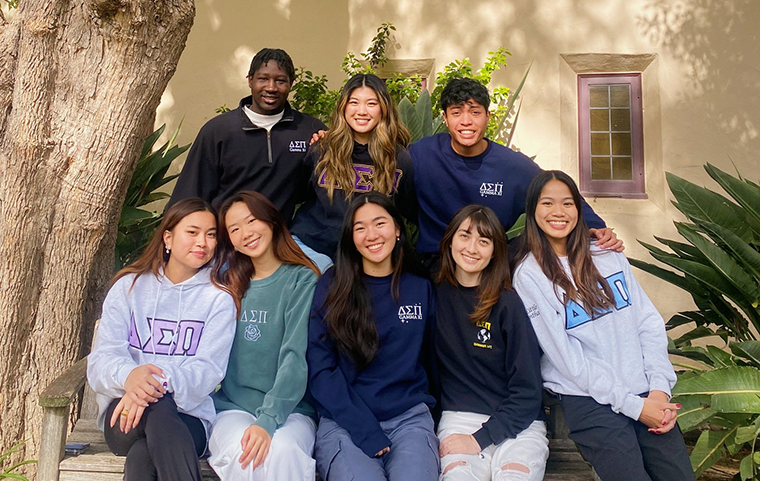
Tay (second left, bottom row) and fellow members of Delta Sigma Pi.
What was one of the more unexpected highlights of your experience at Santa Clara?
I didn’t get to travel a lot growing up, so getting to study abroad in Lisbon, Portugal was a huge opportunity for me to see the world. Knowing that the food, language, and lifestyle would be completely different, I also wanted to push myself into an uncomfortable situation. It was really good practice for becoming more independent.
At SCU, if something is broken in my campus apartment, I could put in a work order, and someone would fix it right away, but that’s not how things work in the real world. Getting that experience was huge for me—and I have to thank LEAD again. They covered that gap between my scholarships and the cost of the program and paid for my flight to Portugal, which I didn’t even know was possible.
Can you tell us about your post-grad plans?
This year, I’m joining the Finance Development Program (FDP) at Apple, which will let me rotate through analyst roles where I’ll be doing mainly financial forecasting. Because I’ll go through four different teams, I’ll get to see what I like, what I don’t like, and what I’ll focus on after that. I’m hoping that eventually I can do a more business technical role and use more of my skills from my Management Information Systems minor, like coding.
I’m so excited about this new experience, and hopefully, I still have that same excitement in five years while doing something that I’m passionate about.
After I graduate, I’m also planning to move to San Francisco, and in the coming years, I want to find a local community organization or nonprofit working in education equity that I can support every month. I believe that education can absolutely change someone’s life, and I’d love to help students from underserved communities get a fair chance at education. Even though my parents didn’t have a lot growing up and weren’t able to do much with their careers, they always instilled a sense of gratitude in me for all the support I’ve received. That’s something I hold close to, and I feel if I’m not practicing gratitude in my life, then I’m not living my life.
The LEAD Scholars Program helps first-generation and transfer students with academic success, community engagement, and vocational exploration.
